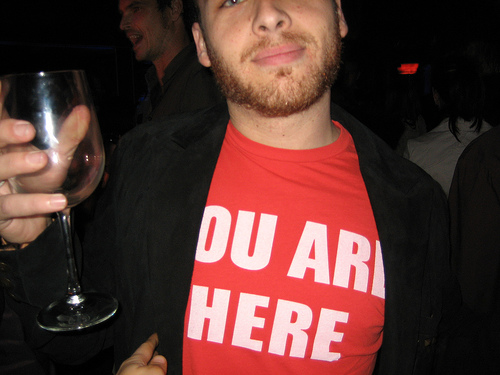Sure, location-based services like Foursquare and Gowalla were well represented at this year's SXSW Interactive conference. But if you were too busy burying your head in your phone, using these services to check into every building, room and crevice of Austin (my own hair included) - you may have missed out on some of the other interesting startups that picked up steam during the conference, including the three following picks:
Hot Potato: Where services like Foursquare allow you to share your location, Hot Potato allows you to share experiences around events. And while some events may revolve about physical locations (which is why Foursquare recently integrated the service into its own app) - they don't all have to be. For instance, you can be watching the same football game another spectator is, without actually being at the game or even in the same place. In this case, your physical coordinates are different, but your presence is with the same event. The service caters to the game, in this case, over the location, since the game is what's tying you together with others at that moment.

Using the Hot Potato site or iPhone app, you can create or choose an event to attend or watch - whether it's a TV broadcast, a birthday party or an airport security conga line -- and share your comments, photos or videos around it. You can also add the event to your friends' calendars (you can hand-select them if you'd like) - to remind them, for instance, to join you in peanut-gallery-ing over the outfits being worn (or the iPad commercials being aired) during the Oscars.
Stickybits: Where Hot Potato is centered about event-type experiences, Stickybits allows you to share experiences around physical things. Using the Stickybits iPhone app (also available in Android), you can attach digital content to barcodes, which you can stick on physical objects (via stickers designed by the company) or find on existing items (e.g., soft beverage cans). Then other folks can use the same app to see the content you've affixed to the item - and even add more content to it themselves.
The possibilities with this type of service are flexible; you can use it for some fun geo-caching to learn the history of where an object has been and the experiences of those who may have come across it. It can also come in handy, say, when you want to share more personalized content on business cards or even make a mix 'tape' (remember those?). When I met with Stickybits' co-founder Seth Goldstein at SXSW, he used StickyBits to create a video of himself eating an empanada and attach it to the empanada truck he got it from - all while we were waiting for the rest of our orders from the same truck.
Since the content you're attaching is digital, you can also update it remotely -- which means you can basically reach someone with a real-time alert as they pick up a can of Coke at, say, a supermarket (hint hint advertisers). Folks can scan the same item and see different attachments each time -- and regular objects can suddenly become little time capsules.
LiveFyre: Where Stickybits connects digital content to physical things, LiveFyre strings together your presence - specifically, your discussions -- from one blog to another in the effort to raise the bar for site commenting. Say, for instance, you find an article in some publication that you'd love to comment on. You have a few valid points to share, but may also be discouraged by the fact that your thoughts may be diluted by those of trolls (y'know, the type of folks who like to announce they were "first!" to comment and/or make remarks about your appearance, or anyone else's appearance, or bananas or something).
Trolls have been an internet weed for years. Every weathered blogger knows that deleting their posts - or even blocking users -- is just about effective in the long run as throwing a stone at one of the Tower of Babel's construction workers. Trolls come back. Sure, you can try to use Facebook Connect to somewhat vet them, but that hasn't proven a solution yet. LiveFyre aims to fix the issue by injecting a measurable reputation system that keeps track of a user's comments across different sites. So instead of reviewing each and every comment and wrestling with their loosely-dubbed "communities," publishers/bloggers can set the threshold level of reputation required to comment on their site, and toggle that as necessary. Naturally, the success of this system depends on adoption by a breadth of sites and users, which has yet to be seen as the service is very much in its infancy (at the moment, it's is in private beta, but publishers can pre-sign-up to embed it). But there's a good incentive for both sides of the coin -- users who want to engage in good discussion and sites that want to encourage productive engagement - to try the product out.
While just a sample, these budding companies suggest that location awareness, while certainly a recent and relevant development, isn't the only problem newer startups are trying to solve -- even if they use it (or plan to) as a tool in their belts, as with the case of the startups described above. Bridging our presence in and between our physical and digital worlds is the larger feat; pinpointing coordinates on a grid is, in some cases, one of several means to that end.